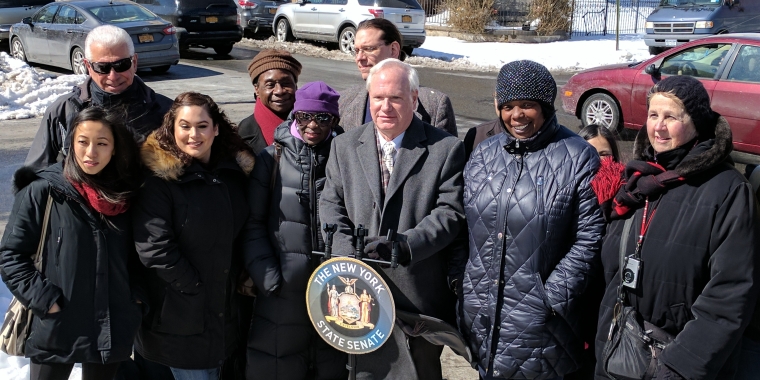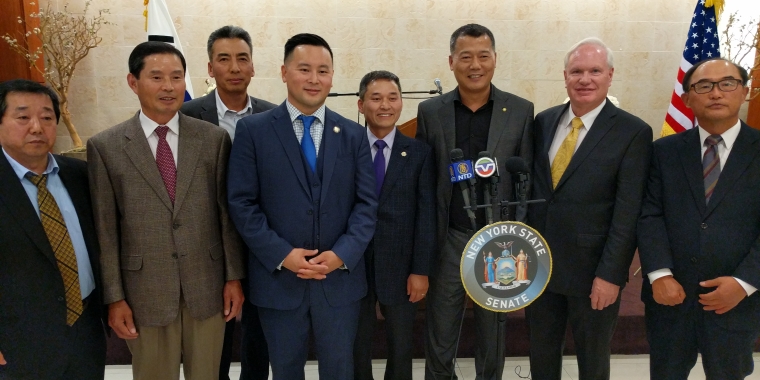
Senator Avella and Brownsville Cultural Coalition Rally to Landmark Church
March 16, 2017
-
ISSUE:
- Preservation
- Landmarking

Queens, NY – This afternoon, State Senator Tony Avella stood with Assembly Member Latrice Walker and members of the Brownsville Cultural Coalition to call on Catholic Charities to preserve Our Lady of Loreto church. The group wants to prevent the demolition of the church, get the church landmarked, and then turn the church into a community recreational center.
The rally became necessary following a meeting with Senator Avella and State Historic Preservation Office Commissioner Rose Harvey where it became evident that Catholic Charities failed to uphold their 2010 resolution to make good faith efforts to preserve the community’s church. The Coalition and Senator Avella claim that Catholic Charities is refusing to uphold the resolution so that the church can fall into disarray and be sold and demolished.
Community members have expressed their concern that the site would then be turned into a homeless shelter—something the neighborhood already has too much of—rather than a community arts and culture center that the community desperately wants.
The Brownsville Cultural Coalition is made up of members of the following groups: Brownsville Heritage House; Commission for Social Justice, Order Sons of Italy in America; Ocean Hill-Brownsville Coalition of Young Professionals; Brooklyn Arts Council; Richmond Hills Historical Society; Preserving East New York; Italian American Studies Association; Purelements: An Evolution in Dance; Friends of East New York; New Jersey Historic Sites Council; NIA Production company.
“The behavior of Catholic Charities in regards to this project is completely unacceptable. Their refusal to uphold the 2010 resolution is clearly a demolition by neglect tactic in order to expedite their efforts to have the church demolished. This community is asking for, and has shown a willingness to work towards, an arts and culture center that can improve the lives of everyone in the community. However, the lack of good faith efforts to maintain the church in favor of demolition has been disheartening and suppresses the efforts of community leaders who want to see this community improved,” said Senator Avella.
NYS Senator Jesse Hamilton said, “Our Lady of Loreto is a living artifact that gives our community a glimpse into the culturally rich history of Brownsville. Landmarking Our Lady of Loreto and dedicating the site to community service preserves a neighborhood treasure. We have an opportunity to uplift this beautiful public space, ennoble our community, and add to the fabric of our civic life. I share the vision outlined by Senator Avella, community advocates, and neighborhood residents, a vision that preserves Our Lady of Loreto and builds a community institution that we can all take pride in.”
“To demolish this church amounts to artistic criminality, and once this church is landmarked and thereby preserved this church will be both a testament to Italian heritage in Brownsville AND a vibrant cultural center that would revitalize the Brownsville neighborhood. As neighborhoods transform over time so must their institutions, especially if the present residents envision the institution to offer opportunities to edify its populace now and for posterity,” added Lou Gallo, NYS Chair of the Commission for Social Justice, Order Sons of Italy in America.
"Let's preserve Brownsville's past and build its future with Our Lady of Loreto Church,” remarked Les Ford, President of NIA Production Company.
“Even after a neighborhood changes over time and a house of worship is converted to another use, the exterior image of the building will always radiate that historical connection to the neighborhood’s past. I feel that Our Lady of Loreto with its unique architecture and its purpose for being built chronicles an important part of the story of Italian immigration in our city,” said Jillian Mulvihill, Richmond Hills Historical Society.
"Research at the Brooklyn Municipal Archives showed that Our Lady of Loreto Church sits on land once owned by Pietro Cesare Alberti, first Italian settler to New Netherlands linking by coincidence two eras of Italian immigration in Brooklyn. Our Lady of Loreto when landmarked would be the first monument on Long Island acknowledging the accomplishments of Italian immigrants," said Dr. Marilyn Ann Verna, Italian American Studies Association.
“Through extensive research I surprisingly discovered that Our Lady of Loreto was the first church in the nation erected in pure Renaissance style, an early example of design-build construction by the New Jersey company of Antonio Federici and Adriano Armezzani, the latter becoming the first Italian-born architect of a New York City Catholic church. They were part of a cadre of skilled immigrant artisans – all had to be Italian-born - expressly chosen to highlight the artistic talents of their native land and to counterattack the nativist prejudice against Italians as being uneducated and uncivilized. The façade with artworks by Paterson, NJ’s famous sculptor-laureate Gaetano Federici include, besides Bernini-style statues in niches, a 33-foot long pediment, entitled The Translation of the House of Mary. This original artistic pediment gives New York the honor of having not only Federici’s largest creation, but also the largest sculptural representation of this Marian devotion outside Italy,” said Mario Toglia, Italian American Studies Association.
Share this Article or Press Release
Newsroom
Go to Newsroom
